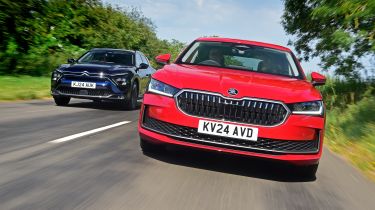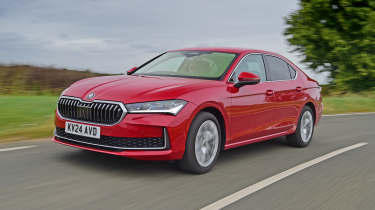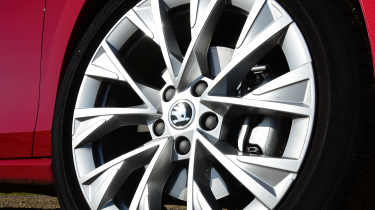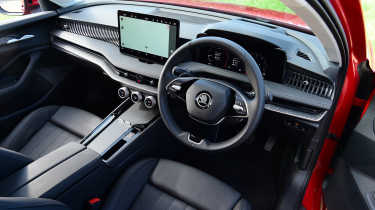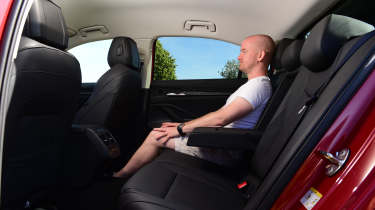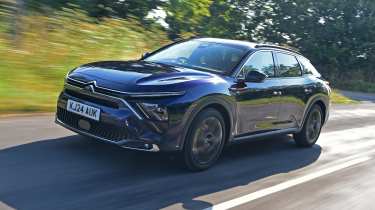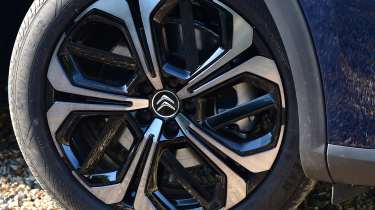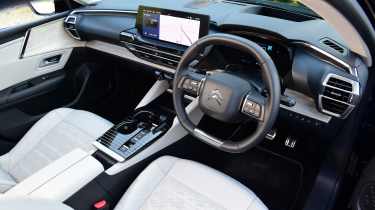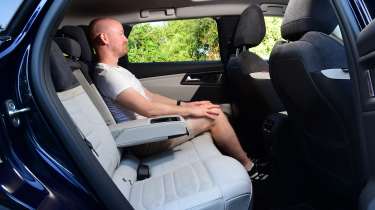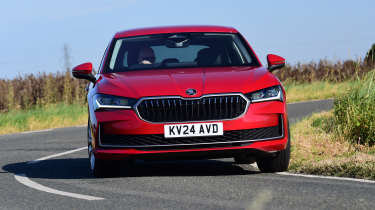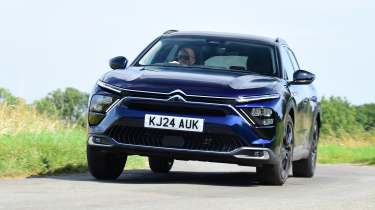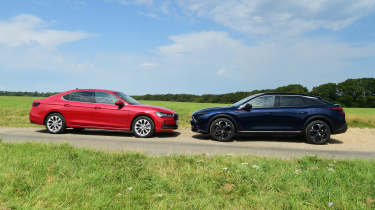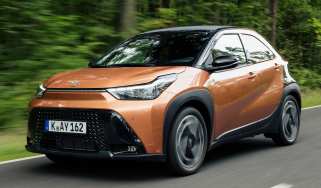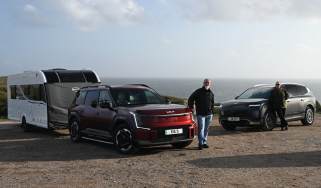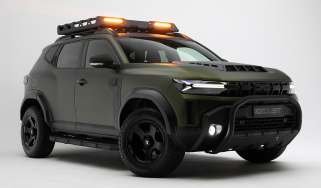Skoda Superb vs Citroen C5 X: practical family cars duke it out
Skoda’s all-new Superb faces Citroen’s C5 X in a large family-car test with a powertrain twist
There was a time when you couldn’t drive more than a few yards before passing a Ford Mondeo or a Vauxhall Vectra, so popular was the breed of large family cars. But as their popularity has declined, they’ve been replaced by SUVs.
While the high-riding, 4x4-inspired alternatives were once not so common, they’re now the default choice. Some people would argue that makes cars such as those in our test here – the all-new Skoda Superb and the Citroen C5 X – the less generic, more interesting choice.
Skoda has been a strong contender in this segment ever since the first Superb of the modern era (the nameplate was formerly used on a large luxury Skoda in 1934) arrived in 2001. Now, the latest model promises more of the same, but with countless improvements.
Its rival, the C5 X, is a left-field choice, and that alone will be enough to tempt some buyers. But how much substance is there behind that Gallic style?
It’s not the first time these two names have locked horns in an Auto Express comparison test. Back in late 2022 when the C5 X was the newcomer, the French machine took on the previous-generation Superb. On that occasion, it was the two most modest petrol options facing off against one another; this time the two powertrains we’ve chosen leave us with another question to answer.
Used - available now

2025 Volkswagen
T-Roc
34,463 milesAutomaticPetrol1.5L
Cash £20,200
2024 Audi
A1 Sportback
16,420 milesManualPetrol1.0L
Cash £17,700
2022 MG
HS
11,500 milesAutomaticPetrol1.5L
Cash £16,000
2023 Skoda
Fabia
20,279 milesManualPetrol1.0L
Cash £14,200Given that the Citroen is powered by a plug-in hybrid powertrain and the Skoda is a diesel, are there benefits to a petrol/electric system beyond Benefit-in-Kind tax breaks? Or is a simpler internal-combustion engine a more frugal option for everyday driving?
| Skoda Superb 2.0 TDI SE L | Citroen C5 X Hypnos PHEV | |
| Price: | £38,405 | £43,290 |
| Powertrain: | 2.0-litre 4cyl, 187bhp | 1.6-litre 4cyl PHEV, 222bhp |
| 0-62mph: | 9.2 seconds | 7.9 seconds |
| Test efficiency: | 48.6mpg/10.7mpl | 42.9mpg/9.4mpl |
| CO2: | 133g/km | 33g/km |
| Annual VED: | £190 | £590 |
Skoda Superb
The model we’re testing is in mid-ranking SE L trim and, in something of a rarity among new cars, is powered by a diesel engine. It’s priced from £38,405, while the options added to the car in these images bring that figure up to £41,420.
Tech highlights
Skoda has kept things fairly simple with the mechanical make-up of the new Superb. It rides on a revised version of the previous version’s MQB architecture, which has allowed the brand to instead focus on the finer details that should make the Superb easier to live with every day.
These include the aerodynamics; behind the subtle styling tweaks, such as a reshaped grille and slimmer headlights, are changes to help the Superb cut through the air more cleanly. A more steeply raked windscreen, an optimised roof shape and rear spoiler, air curtains in the front bumper and tweaked door mirrors, among other features, contribute to an aerodynamic drag figure of 0.23, a 10 per cent improvement on the last model.
These factors help the powertrain line-up work at its best. A PHEV capable of 62 miles in electric-only mode is only offered with the estate from launch, but it’s up to diesel to offer the headline-grabbing mpg numbers with our saloon test car. This is powered by a 2.0-litre unit, with 148bhp and 360Nm of torque, which sends drive to the front wheels via a seven-speed dual-clutch gearbox.
Safety: The Superb scored a maximum five stars in its 2024 Euro NCAP test. Eight airbags are standard, while side airbags for the second-row passengers are optional. Emergency Steering Assist, Turn Assist, Crossroad Assist and Exit Warning are all new, while an improved side-assist system can spot potential hazards from 20 metres further away than before, reaching up to 90 metres behind the car.
On the road
Llong-distance cruising with four people on board is what each of these cars does best, but the Skoda has an impressively wide spread of talents.
Around town: For a car that measures the best part of five metres long, the Superb is impressively wieldy at low speeds. The steering is light and there’s plenty of lock, which makes parking in tight spots barely more difficult than in a regular family hatchback. The automatic gearbox is a little laggy when moving off from a standstill, but that aside, the high torque figure produced by the diesel engine makes it feel easy going.
A & B-roads: The engine lets you make the most of that torque at higher speeds, too. There’s rarely much need to extend the motor to its maximum, although on the occasions when it’s required, the diesel unit is fairly smooth and muted. And given that there’s not a huge amount of outright speed to exploit, it encourages an easy-going driving style.
That’s an approach that’s well matched to the chassis. The Superb’s suspension is reasonably soft, which results in noticeable but well contained body roll through the corners. Grip is strong until the front end eventually washes wide. The set-up also delivers a soothing ride, which is controlled, but with forgiving responses over larger bumps.
One of the few things that takes the shine off is that our test car had a slight fidget at all speeds; it’s by no means harsh but it is always present.
Motorway: The soft suspension mixes with terrific stability which, combined with low wind and road noise, results in a fantastic long-distance cruiser. At higher speeds, the Skoda’s engine settles down and is barely audible from inside the cabin, with minimal vibration, too.
Ownership
Skoda’s interior designers have really been on form recently, and the basic architecture doesn’t vary wildly from what you’d find in an Octavia or Enyaq. But there are small detail changes that make the Superb better than either of them.
Little features such as the knee pad on the centre console to improve driver comfort are signs that Skoda has paid close attention here. Some of features that fall under the brand’s list of ‘Simply Clever’ gadgets and design considerations, such as the door-mounted umbrella and ice scraper/tyre tread depth gauge stored in the fuel filler flap, are now produced from more sustainable materials.
The best addition to this Simply Clever list (Skoda says that there’s now a total of 28 different features in total for the Superb) are the ‘Smart Dials’ mounted below the central air vents. At first glance, they look like big physical dials for the climate controls – and they are, but there’s a little more to them than that. By pressing the centre dial, its function can be changed from a variety of options, including fan speed, audio volume, map zoom and, when specified, various driving modes.
The outer dials serve more than one purpose, too; a long press can sync the two sides of the dual-zone climate control together, while shorter presses bring up the settings for the heated and cooled seats, ready for them to be adjusted.
Storage: There’s no shortage of places to hide things away inside the Superb’s cabin. The storage bin between the front seats has a vast 5.5-litre capacity, while there’s also plenty of space inside the door bins. And all these are also carpeted to prevent items from rattling against the trim.
Moving the gear selector onto the steering column has freed up more space on the Superb’s centre console. A pair of cup-holders and a large smartphone tray, which can wirelessly charge devices, sit beneath a pair of sliding covers.
Practicality
The Skoda Superb has always been a class leader when it comes to space, and the new model is better than ever.
Rear Space: We’ve never complained about the old Superb being miserly for interior space, but that hasn’t stopped Skoda from offering even more this time around. It says that rear headroom has been increased by 6mm over the last Superb, but it’s the massive kneeroom that passengers will appreciate most. It’s even reasonable for three people in the back, thanks to a wide middle seat, although the central hump in the floor is quite high.
Boot: The impressive size continues in the back, where overall storage space has increased by 20 litres more than the car it replaces, now standing at a cavernous 645 litres. Two smaller compartments to the side of the main load area – one of which is enclosed – are useful features, too.
What to buy?
Which version we’d choose...
- Powertrains: There’s no PHEV version of the saloon, but mild-hybrid tech is fitted to the 148bhp 1.5 TSI petrol. The top-spec L&K is available with a 2.0-litre petrol with 261bhp. While the diesel here is good enough, those after more power can turn to a 190bhp, 400Nm version, but it’s not available with SE Tech trim.
- Trim: The SE Tech also misses out on matrix LED headlights, but it still gets very bright standard LED units. Beyond that, it’s mainly luxury additions such as massaging leather seats and an automatic tailgate – hardly necessities – that you’ll need to pay extra for.
- Our choice: Hit the entry level and go for the SE Tech with a frugal diesel engine.
Citroen C5 X
The Citroen C5 X we’re testing here is an all-new range-topping trim. Called Hypnos, it’s the most lavishly equipped variant we’ve seen yet, and is priced to reflect this, at £43,290.
Tech highlights
AS with the Superb, the C5 X makes the most of a platform that’s widely used throughout its multi-brand parent group. In this case, it’s the EMP2 architecture that the C5 X stretches to one of its largest sizes across the Stellantis family. While EMP2 can accommodate diesel powertrains, there isn’t one to order here. But there is a plug-in hybrid powertrain; ironic given its absence in the Superb.
In this case, it means you’re getting a 1.6-litre turbocharged petrol engine that teams up with a 109bhp electric motor. In total, that translates into 222bhp and 360Nm of torque. That’s more power and force than the Skoda can muster, and the benefit of an e-motor is that much of that torque arrives as soon as you touch the throttle pedal.
But the main talk surrounding the C5 X since its launch has been on its uncompromising focus on keeping its occupants as relaxed as possible. The trick lies in its suspension technology, called Advanced Comfort. This consists of a second set of dampers that replace the traditional passive bump stops used on most cars.
These allow a much greater degree of control at the end of the suspension travel, which permits the springs and the primary dampers (which are adaptive in this PHEV model) to use a softer set-up.
Safety: The C5 X only scored four stars when it was tested by Euro NCAP. The organisation noted that the Citroen’s “autonomous emergency braking system performed marginally in tests of its reaction to other vehicles”, which contributed to a Safety Assist mark of 66 per cent.
On the road
Citroen set out to create a comfortable cruiser, and it has absolutely succeeded on that front.
around town: The benefits of the Advanced Comfort suspension are obvious from the get go. The ride is very soft; over bumps that unsettle even the Skoda, the Citroen just gently sways across them. It’s a relaxing response that will feel familiar to anyone who drove the early nineties equivalents of cars such as these. But it’s a quality that, through models with sporty pretensions and huge wheels, has largely been lost since then.
A & B-roads: The suspension has some minor drawbacks at higher speeds, though. Hit a larger bump and the suspension takes a couple of bounces before it settles fully, and around corners, the car leans more than the Superb. Accept that the C5 X doesn’t enjoy being pushed – the light and vague steering also discourages this – dial into its responses and there’s still satisfaction to be had.
Grip isn’t as strong as in the Skoda, but that mix of lean and the front initially pushing very gently wide means that it feels completely predictable. The PHEV powertrain delivers strong straight-line performance. It isn’t the smoothest system of its type when transitioning between electric and petrol power and the engine can sound strained, but overall it delivers a fairly consistent surge.
Motorway: The C5 X is at its best on a motorway, where it glides along the road as smoothly as many air-suspended luxury cars. Two small exceptions blight the otherwise superb comfort. One is that the suspension can be caught out by imperfections, which can be felt in the form of a sharp clunk over expansion joints and potholes. The other is the bassy, boomy rumble that’s emitted by the tyres.
Ownership
The best Citroens have always offered something just a bit different from the norm, and that’s the case with the C5 X. This top-spec Hypnos model is furnished with soft, pale leather on the seats and light wood-effect trim on the dashboard (the latter of which brightens up the cabin of both Plus and Max trims). Both are design choices that give the Citroen a less Teutonic feel that so many similarly priced cars – Superb included – so often plump for.
Fortunately, the quality and finish on the whole feel good enough to justify that difference. There’s a little more piano-black plastic than we’d like (although parts on the centre console are split with a bronze-coloured pinstripe to add more interest) and not all of the buttons operate with the same, solidly damped feel of those in the Superb, but the overall ambience feels well worth the price.
The seats quite literally bolster the C5’s comfort endeavours further. You won’t find big hip and shoulder-supporting sports chairs here; instead, different parts of the seat use different grades of foam to cushion the occupants’ torsos as effectively as possible. They’re much softer than many of the seats we’ve found in most other modern cars, and the wide, flat area makes it easy to get comfortable.
There was a time when the French brands had a reputation for patchy reliability, but Citroen has put that behind it. In our 2024 Driver Power satisfaction survey, the proportion of Citroen owners that experienced a fault of some sort with their vehicle totalled just 15 per cent – only four car makers fared better. This contributed to an overall manufacturer ranking of fifth out of the 32 brands covered. In contrast, Skoda finished 23rd overall, with 23.7 per cent of owners experiencing faults.
Storage: One of the compromises of the PHEV system is that the hybrid battery’s location takes away storage space in the centre console. The bin between the front seats is very shallow, therefore.
Practicality
In almost any other contest, the C5 X would sit among the most spacious cars around, but the Skoda has an edge in passenger room and a much larger boot.
Rear Space: There’s very little to separate the Skoda and the Citroen for kneeroom, but it’s above where the C5 X loses out to its rival, because the Superb has an extra 73mm of headroom. The Citroen is more comfortable in the centre seat, which is slightly softer, while the central hump in the floor is also lower and slimmer.
Boot: The inclusion of a plug-in hybrid powertrain compromises overall storage ability. Official volume is 485 litres, but even non-PHEV models are well behind the Superb, at 545 litres. In isolation, however, that’s still a very generous amount of luggage space. The seats fold very flat, though, and boot floor runners make loading items a little easier.
What to buy?
Which version we’d choose...
- Powertrains: The most intriguing engine option here comes with the hybrid powertrain. While it’s not as powerful as the plug-in unit, its real- world economy potential will be just as good, especially if you frequently cover longer journeys. It’s also a full £7,060 cheaper in matching trim levels.
- Trim: The least expensive version of the PHEV comes with the Plus model, which has a list price of £39,300. Plus trim does without a 360-degree parking camera and a powered tailgate, while electric seats are optional, but it’s still generously equipped otherwise.
- Our choice: Unless you get a BiK incentive, forget the PHEV and go for the hybrid in Plus trim.
Results
Which car comes out on top?
Winner: Skoda Superb
Even in its previous iteration, the Superb was strong enough to see off the closest competition. With this new model sticking to the same formula while introducing a wider range of small but positive changes, it has managed to pull itself even further clear of the rest of the field.
When it comes to space, usability and value for money, little else can come close, and in the areas where the Citroen is ahead, such as ride, our gripes with the Superb are minor. Family cars are rare now, but the standard of what’s left is so high.
| Pros | Cons |
| Space | Ride occasionally fidgets |
| Refinement | Modest performance |
| Overall value and running costs | Not that much fun to drive |
| Interior finish and ergonomics | High loading lip in boot |
Runner-up: Citroen C5 X
Citroen's greatest hits tend not to blow rivals away across the board, but instead offer very compelling reasons to pick them over other cars. In that regard, the C5 X succeeds.
Few models at this price are so relaxing to drive (or be driven in) which, combined with the Citroen’s unique style, will make this a car that some people will love, even if it doesn’t suit everyone. It’s a shame that the PHEV powertrain doesn’t show the C5 X in its best light, and is pricey on a PCP deal, too.
| Pros | Cons |
| Brilliant ride | Underwhelming economy |
| Interior space | Uninspiring powertrains |
| Powerful PHEV system | Road noise |
| Unique design | High monthly finance costs |
Rivals and other options
The Superb wins our test, but what else is out there?
- Same class: Lexus ES
- Same money: Jaguar XF
- Used: Ford Mondeo
- Used: Mercedes E-Class
- Coming soon: Next-gen Hyundai Ioniq 6
The great debate
The Auto Express team have their say…
Paul Barker, editor: “The phrase ‘All the car you’ll ever need’ is something of a cliche in our line of work, but it’s one that certainly applies to the Superb. There really are so few flaws in this new model that we can’t imagine many people not falling for it if they selected the Skoda as their next family car.”
Richard Ingram, deputy editor: “A plug-in hybrid brings a few too many drawbacks in a car such as the C5 X, especially when there are many full EVs for similar money. If you don’t want to go for an SUV, then the Tesla Model 3 offers plenty of space, performance and efficiency, and starts from a punchy £39,990.”
Dawn Grant, picture editor: “Finding a rival to top the Superb is tricky, but one of the greatest thorns in its side is actually its smaller brother. The Octavia doesn’t quite have as much rear legroom, but the boot is almost as vast and in some specs it’s even more comfortable. Most importantly of all, the Octavia starts from just £26,775.”
Alastair Crooks, senior news reporter: “Think the Skoda Superb hatch is spacious? It’s got nothing on the Estate version. Thanks to that longer roofline, rear headroom is 22mm greater than in the hatchback, while further back the boot expands to a truly cavernous 690 litres. You’ll be buying wardrobes just for fun.”
Dean Gibson, senior test editor: “If the C5 X is just too quirky for you and you’re an SUV fan, then the C5 Aircross is well worth a look. It’s not quite as plush inside, but it’s almost as comfy and still spacious. Most importantly, it’s still got enough of that Citroen character to stand out from the rest of the crowd.”
Which would you buy? Let us know in the comments section below…
Specs and prices
| Skoda Superb 2.0 TDI SE L | Citroen C5 X Hypnos PHEV | |
| On the road price/as tested | £38,405/£41,420 | £43,290/£43,290 |
| Engine | 4cyl inline/1,968cc diesel | 4cyl inline PHEV/1,598cc |
| Hybrid system | N/A | 109bhp e-motor, 14.2kWh batt. |
| Power/torque | 187bhp/330Nm | 222bhp/360Nm |
| Transmission | Seven-speed auto/fwd | Eight-speed auto/fwd |
| Fuel tank capacity/spare wheel | 66 litres/£185 | 52 litres/dealer option |
| Length/wheelbase | 4,912/2,841mm | 4,805/2,785mm |
| Height/width | 1,481/1,849mm | 1,485/1,865mm |
| Boot capacity (seats up/down) | 645/1,795 litres | 485/1,580 litres |
| Kerbweight/payload/towing weight | 1,662/548/2,200kg | 1,722/463/1,350kg |
| Turning circle | 11.1 metres | 11.1 metres |
| Basic warranty (miles)/recovery | 3yrs (60,000)/3yrs | 3yrs (60,000)/1yr |
| Driver Power maker position | 15th | 3rd |
| NCAP: Adult/child/ped./assist/stars | 91/91/70/95/5 (2021) | 87/86/66/72/5 (2022) |
| 0-62mph/top speed | 9.2 secs/139mph | 7.9 secs/145mph |
| Auto Express economy/range | 48.6mpg/706 miles | 42.9mpg/491 miles |
| WLTP combined | 56.0mpg | 186.2mpg |
| WLTP combined | 12.3mpl | 41.0mpl |
| Claimed CO2/tax bracket | 133g/km/31% | 33g/km/12% |
| Number of airbags/Isofix points | Eight/three | Six/two |
| Parking sensors/camera | F&r/yes | F&r/360-degree |
| Lane-keep assist/blindspot/AEB | Yes/yes/yes | Yes/yes/yes |
| Climate control/adaptive cruise ctrl | Three-zone/yes | Three-zone/yes |
| Leather/heated seats | Yes/yes/£600* | No/f&r/yes |
| Metallic paint/LED lights | £660/yes | £650/yes |
| Keyless entry & go/powered tailgate | Yes/yes | Yes/yes |
| Sat-nav/digital dashboard/USBs | Yes/yes/four | Yes/yes/four |
| Online services/wireless charging | Yes/yes | Yes/yes |
| Apple CarPlay/Android Auto | Yes/yes | Yes/yes |

